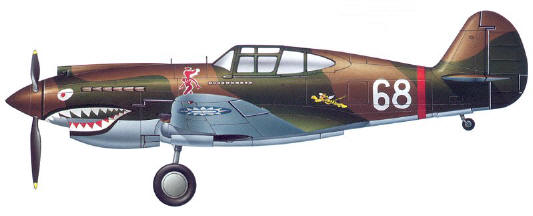

Plane type: Single-seat fighter or fighter-bomber
Manufacturer: Curtiss
Crew: 1 (pilot)
Dimensions
Length: 33ft 1 and 3.75 in. (10.14 meters)
Height: 12ft 2in (3.7 meters)
Wingspan: 37ft 3.5in (11.36 meters)
Wing Area: 236 sq. ft (21.9 sq. m)
Powerplant
- P-40: 1 x Allison V-1710-33 engine
- P-40D: 1 x Allison V-1710-39 engine
- P-40F: 1 x Packard V-1650-1 (Rolls Royce Merlin 28 engine)
- P-40K: Allison V-1710-73 engine
- P-40M: Allison V-1710-81 (F20R) engine
- P-40N: Fitted successively with the Allison V-1710-81 (F20R), V-1710-99 (F26R), and V-1710-115 (F31R) engines
- XP-40Q: Allison V-1710-121 engine
Weights (P-40F)
Empty: 6550 lbs (2974 kg)
Weight loaded: 8720 lbs (3960 kg)
Armament (P-40F)
- 3 x .50-cal machine guns in each wing
- 1 x bomb rack under fuselage capable of carrying one 100-600 lb bomb
- 1 x bomb rack under each wing capable of carrying one 100-500 lb bomb each or one fuel tank each
Performance (P-40F)
Maximum speed: 364 mph (582 Km/h) @ 20000 ft (6100 m)
Cruising speed: 300 mph (480 Km/h)
Economical cruising speed: 220-245 mph (352-392 Km/h)
Normal range: 610 miles (976 km) at 310 mph (496 Km/h)
Maximum range (with auxiliary fuel tank): 12000 miles (1920 km) at 210 mph (336 Km/h)
Ceiling: 33000 ft (10060 m)
Notes:
While not known as the best fighter in the war, the Warhawk performed well for its time period. It preceded all the more advanced aircraft, and was used largely in the first half of the war. The most commonly used model of the Warhawk was the P-40F. Continuous modifications were made, and the aircraft was exported the RAF under the new name "Tomahawk." The next model given to the RAF was dubbed the "Kittyhawk." The US version remained the "Warhawk" and it is often referred to as "The Hawk" to avoid confusion. Production of "The Hawk" ended in 1944.
RESOURCES:
Page #1 - The Flight Line
Page #2 - USAF Museum
Page #3 - Aviation History Online
Page #4 - Warbird Alley
Page #5 - WW2 Warbirds
Page #6 - New Zealand Fighter Pilots Museum


![]()
Pictures: